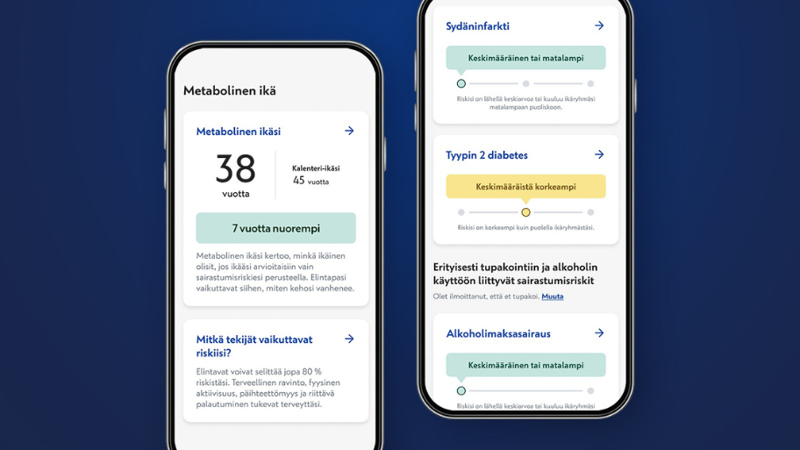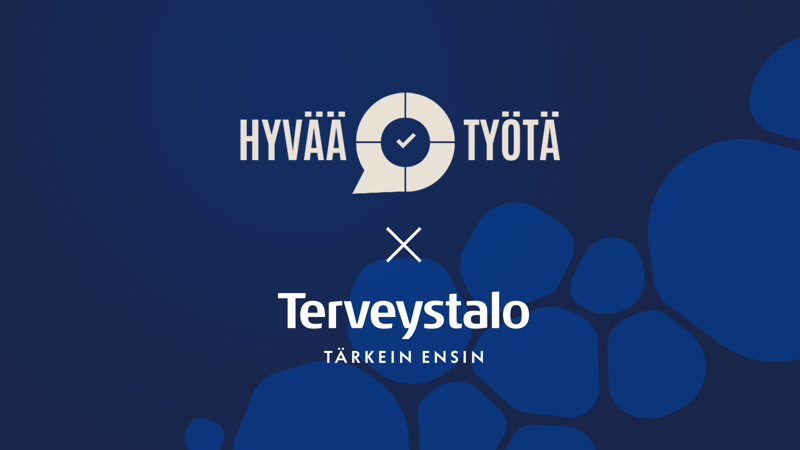Supervisors play a key role in identifying substance abuse problems
Alcohol is a legal intoxicant used by the majority of Finns. In principle, the employer does not have the right to interfere in the leisure activities of its staff, but in situations where the use of intoxicants during free time affects work, intervening is justified. It is the supervisors’ responsibility to not hesitate to ask questions if they are concerned about an employee's behavior. According to Sanna Eronen, Chief Occupational Health Psychologist at Terveystalo, it is respectful and caring to be open and direct about an issue, but intervening in another person’s behavior is something that most people prefer to avoid. Even though speaking up is difficult, postponing the discussion poses a much greater risk.

Substance abuse problems may manifest themselves through various signs. The signs may be quite vague and make the supervisor wonder if they should be concerned about the employee. There may be changes in the employee’s general alertness and conduct, making it hard for them to be as efficient at work as before. They may also have had more sickness absences than usual. In order to prevent possible substance abuse from becoming a major problem, supervisors must know how to raise the issue at an early stage.
In addition to subtle signs, the supervisor may notice signs of substance abuse during the employee’s free time or at work-related events. For example, the employee may often call in sick after a night out or a company Christmas party. The most obvious signs of substance abuse at the workplace include smelling of alcohol or constantly appearing hung over or even intoxicated.
“In order to be able to bring up difficult issues, the work community must have established an atmosphere that supports difficult discussions. Supervisors should ensure a positive relationship that encourages dialogue with the employees before problems arise. One clear way, for example, is to regularly review your company's substance abuse prevention model with your work community. This way, everyone will have the courage to speak to the supervisor if they have concerns about a colleague,” says Eronen.
How do I express my concern?
Eronen emphasizes that the most important thing in speaking up is preparation.
“Make sure you thoroughly understand what you're worried about so you know how to put it into words. The employee needs to understand what the feedback is about. Seek reassurance by discussing the matter in advance with the HR Director and your supervisor.”
In the discussion, the employee must be given the opportunity to explain the situation in their own words. Sometimes, new information may arise, making it important to correct your initial assumptions.
“Instead of a debate, the discussion should take the form of interaction where the manager is expected to be able to actively listen. If the employee disputes everything, ask them to give their views on the situation in their own words and focus on agreeing on the next steps.”
Active listening* is:
- Receptive. The listener considers the message important and meaningful.
- Focused. The listener thoroughly focuses on the issue.
- Respectful. We hear the speaker as they are.
- Patient. The listener trusts that the speaker will open up when they are ready.
Simply expressing your concern can often ignite the internal motivation to make things right. Even if the employee denies everything during the discussion, it may act as an incentive to make changes in their life.
“Expressing concern means caring about the employee's well-being. Referral for treatment or setting other boundaries always gives the employee a chance to make changes,” says Eronen.
More support for supervisors to address substance abuse problems
Terveystalo has revised its treatment model for substance abuse problems, which is now supported also by coaching for supervisors. The coaching helps supervisors address substance abuse problems at the workplace. The coaching offers supervisors information and tools to identify substance abuse problems, speak up and take action at an early stage. The coaching is suited for supervisors of workplaces of all sizes and can be completed completely remotely when it best suits your schedule.
Learn about addressing substance abuse issues in the workplace and download support materials
What is the cultural attitude in your organization towards alcohol and other substance use? Do HR and supervisors have the awareness and tools for early intervention and supporting employees when help is needed? Read more on the topic and download support materials for supervisory work.
Read more articles

The renewed lifestyle disease risk report from health examinations provides more information and reinforces prevention
Starting in February 2026, the lifestyle disease risk report will include an estimate of metabolic age and compare each individual's results with data collected from working-age people at Terveystalo.

What is metabolic age and why should you care about it?
A new laboratory study by Terveystalo reveals how your body is aging. Metabolic age makes biological aging visible.

Suun Terveystalo expands its expertise and network – also for the benefit of occupational health customers
At Terveystalo, oral health is an integral and essential part of overall well-being and health. Our expanding oral health care network enables us to provide comprehensive services to both employees and customers throughout Finland. Our goal is to ensure smooth access to care and to remain at the forefront of developments in the field.

Terveystalo joins leading working life actors at the Hyvää työtä Forum
New cooperation opens up opportunities for building a more positive working life.

Research result: Evaluating the effectiveness of healthcare requires sufficiently sensitive indicators
When developing healthcare, the focus is usually on effectiveness and measurable evidence. From the perspective of the individual patient, it is important to understand whether the treatment will bring them real benefits, rather than just more procedures. From the perspective of society, it is important to know where limited resources should be allocated.

Smooth assistance for your needs – our AI assistant is now at your service
You can now find Terveystalo’s AI assistant on our website — a quick and easy way to get answers based on the information available on our site. For now, the assistant is available only on the Finnish‑language section of our website, but you can chat with it in English.